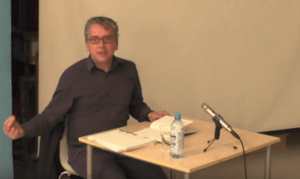Mark Fisher facts for kids
Quick facts for kids
Mark Fisher
|
|
|---|---|

Fisher in 2011
|
|
| Born | 11 July 1968 Leicester, England
|
| Died | 13 January 2017 (aged 48) Felixstowe, England
|
| Other names | k-punk |
| Alma mater |
|
|
Notable work
|
|
| Spouse(s) | Zoë |
| School | Continental philosophy |
| Institutions | Goldsmiths' College, London |
| Thesis | Flatline Constructs (1999) |
|
Main interests
|
|
|
Notable ideas
|
Capitalist realism, business ontology |
|
Influences
|
|
Mark Fisher (July 11, 1968 – January 13, 2017) was an English writer, music critic, and teacher. He was also known by his blog name, k-punk. Fisher taught at Goldsmiths, University of London.
He became well-known in the early 2000s for his blog, k-punk. His writing often explored radical politics, music, and popular culture. Mark Fisher wrote several books, including the popular Capitalist Realism: Is There No Alternative? (2009). He also wrote for magazines like The Wire and New Statesman. Fisher helped start two publishing companies, Zero Books and Repeater Books.
Contents
Early Life and Education
Mark Fisher was born in Leicester, England. He grew up in Loughborough. His parents were working-class and held conservative views. His father was an engineer, and his mother was a cleaner.
As a young person, Fisher was greatly influenced by music magazines. These magazines, like NME, often mixed music with politics, film, and stories. He also saw how football connected to working-class culture. He was present at the Hillsborough disaster.
Fisher studied English and Philosophy at Hull University. He earned his degree in 1989. Later, he completed his PhD at the University of Warwick in 1999. His PhD paper was called Flatline Constructs.
During his time at Warwick, Fisher helped create a group called the Cybernetic Culture Research Unit. This group explored ideas about technology and culture. He also made techno music in the early 1990s with a group called D-Generation.
After teaching philosophy for a while, Fisher started his blog, k-punk, in 2003. A music critic named Simon Reynolds called it "a one-man magazine." He said it was better than most magazines in Britain. The blog became a central place for discussing popular culture, music, film, and politics. Vice magazine said his writing on k-punk was "clear and eye-opening." Fisher used his blog to write more freely than in academic papers.
Mark Fisher's Career and Writings
Mark Fisher became a lecturer at Goldsmiths College. He also worked as an editor at Zero Books. He was part of the editorial board for Interference: A Journal of Audio Culture. In 2009, Fisher edited a book about Michael Jackson called The Resistible Demise of Michael Jackson. He also published Capitalist Realism: Is There No Alternative?. This book looked at how neoliberalism affected modern culture.
Fisher was one of the first to criticize "call-out culture." In 2013, he wrote an essay called "Exiting the Vampire Castle." He argued that this culture made it hard for people to work together. He felt it focused too much on blaming individuals instead of solving problems as a group.
In 2014, Fisher released Ghosts of My Life. This book was a collection of essays. It explored themes like depression and "lost futures" through music and film. He also wrote for magazines like Fact and The Wire. In 2016, he co-edited a book about the post-punk music era.
Understanding Capitalist Realism
In the late 2000s, Mark Fisher used the term "capitalist realism" in a new way. He used it to describe a common feeling: that capitalism is the only possible way to organize society. He said it felt impossible to even imagine a different system.
He explained this idea in his 2009 book, Capitalist Realism: Is There No Alternative?. Fisher argued that since the fall of the Soviet Union, capitalism has shaped everything. This includes education, mental health, and pop culture. He famously wrote that it is "easier to imagine an end to the world than an end to capitalism."
Fisher described capitalist realism as a widespread feeling. It affects how we create culture and how we work and learn. It acts like an invisible wall that limits our thoughts and actions.
This idea is influenced by thinkers like Louis Althusser, Fredric Jameson, and Slavoj Žižek. It also connects to Antonio Gramsci's idea of Cultural hegemony. This is when one way of thinking becomes so common that it seems like "common sense." Fisher believed that within capitalism, there's no room to think about other ways to organize society. He felt that younger generations weren't even trying to find alternatives.
He argued that the 2008 financial crisis made this feeling stronger. Instead of leading to new ideas, it made people think they just needed to fix the current system. Fisher also said that capitalist realism has led to a "business ontology." This means everything, even education and healthcare, is seen as a business.
Exploring Hauntology
Mark Fisher helped make the term "hauntology" popular. He used it to describe a feeling in modern culture. It's like being "haunted" by "lost futures" from the past. These are ideas about the future that never happened or were stopped.
Fisher noted that changes in the economy since the late 1970s have affected artists. He argued that artists have lost the money and support needed to create new things. Unlike the nostalgia or copying of past styles in postmodern culture, Fisher defined hauntological art differently. He said it explores these blocked paths. It shows a "refusal to give up on the desire for the future." It's a "longing for a future that never arrived."
Fisher explained the political importance of this idea. He wrote that when the present gives up on the future, we must listen for hints of the future in the unused possibilities of the past.
Fisher and critic Simon Reynolds used this idea to describe a music trend in the mid-2000s. Fisher's 2014 book Ghosts of My Life looked at these ideas through culture. He discussed music by Burial and Joy Division. He also looked at TV shows like Sapphire & Steel and films by Stanley Kubrick.
The Weird and the Eerie
Fisher's book The Weird and the Eerie was published after his death. It explores the ideas of "the weird" and "the eerie." He defined these as powerful ways of telling stories. They can make us question our usual understanding of reality. They show us the hidden forces that shape our world.
One writer summarized Fisher's ideas by saying: "weirdness appears at the edge between worlds; eeriness comes from the ruins of lost ones." The book discusses science fiction and horror works. These include writings by H. P. Lovecraft and films by David Lynch. It also looks at music by the band The Fall.
Acid Communism
Before his death, Fisher was planning a new book called Acid Communism. Parts of this book were published in a collection of his writings in 2018. Acid Communism aimed to bring back ideas from the 1960s counterculture. It used ideas from psychedelia to imagine new political possibilities for the Left.
On Vanishing Land
After Fisher's death, the Hyperdub record label released an audio-essay. It was created by Justin Barton and Mark Fisher in 2019. Fisher and Barton put together music from different artists to go with the text. Barton wrote the text, with some ideas from Fisher. The essay describes a walk along the Suffolk coastline in 2006. Both Barton and Fisher narrate the essay.
Critique of Economics
Mark Fisher also questioned the field of economics. He believed it was a "science" that shaped reality to fit its own ideas. He felt it did not truly examine reality. He thought economics was a powerful trick that made people believe in its ideas.
Death and Legacy
Mark Fisher passed away on January 13, 2017. He had been struggling with depression. He had sought help in the weeks before his death. He openly discussed his struggles with depression in his articles and in his book Ghosts of My Life.
According to Simon Reynolds, Fisher believed that widespread mental health problems cannot be understood or healed if seen only as private issues. He argued that they are also connected to society.
Fisher is remembered as a very influential thinker. Alex Niven wrote that Fisher's ability to understand what was wrong with modern culture was remarkable. Rob Doyle in The Irish Times called him "a more interesting British writer" of this century. The Guardian said Fisher's k-punk blog posts were "required reading for a generation." Roger Luckhurst called him "one of Britain's most clear-sighted cultural commentators."
In his memory, a music album called It's a Desert Out There... was released. The money from this album was given to Mind, a mental health charity.
See also
 In Spanish: Mark Fisher (teórico) para niños
In Spanish: Mark Fisher (teórico) para niños


